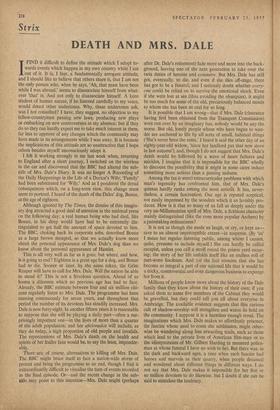Strix
DEATH AND MRS. DALE
/FIND it difficult to define the attitude which I adopt to- wards events which happen in my own country while I am out of it. It is, I fear, a fundamentally arrogant attitude, and I should like to believe that others share it, that I am not the only person who, when he says, 'Ah, that must have been while I was abroad,' seems to disassociate himself from what- ever 'that' is. And not only to disassociate himself. A keen student of human nature, if he listened carefully to my voice, would detect other undertones. Why, these undertones ask, was I not consulted? 1 have, they suggest, no objection to my fellow-countrymen passing new laws, producing new plays or embarking on new controversies in my absence; but if they do so they can hardly expect me to take much interest in them, far less to approve of any changes which the community may have made in its arrangements while I was away. It is because the implications of this attitude are so unattractive that 1 hope others besides myself unconsciously adopt it.
I felt it working strongly in me last week when, returning to England after a short journey, I switched on the wireless in the car and discovered that the BBC had altered the sub- title of Mrs. Dale's Diary. It was no longer A Recording of the Daily Happenings in the Life of a Doctor's Wife; 'Family' had been substituted for 'Wife.' And as I pondered the dread consequences which, on a long-term view, this change must seem to portend, I heard of the death of the Dales' dog, Bosun, at the age of eighteen.
Although ignored by The Times, the demise of this imagin- ary dog attracted a good deal of attention in the national press on the following day; a real human being who had died, like Bosun, in his sleep would have had to be extremely dis- tinguished to get half the amount of space devoted to him. The BBC, choking back its corporate sobs, described Bosun as a large brown mongrel, so that we actually know more about the personal appearance of Mrs. Dale's dog than we know about the personal appearance of Hamlet.
This is all very well as far as it goes; but where, and how, is it going to end? Eighteen is a great age for a dog, and Bosun had to die. Sooner or later, by the same token, the Grim Reaper will have to call for Mrs. Dale. Will the nation be able to stand it? This is not a frivolous question. Ahead of us looms a dilemma which no previous age has had to face. Already, the BBC estimate between four and six million citi- zens regularly listen to Mrs. Dale. The programme hai been running continuously for seven years, and throughout that period the number of its devotees has steadily increased. Mrs. Dale is now forty-eight. In another fifteen years it is reasonable to suppose that she will be playing a daily part—often a sur- prisingly important one—in the lives of more than a quarter of the adult population; and her aficionados will include, as they do today, a high proportion of old people and invalids. The repercussions of Mrs. Dale's death on the health and spirits of her frailer fans would be. to say the least, imponder- able. after Dr. Dale's retirement) fade more and more into the back- ground, leaving one of the next generation to take over the twin duties of heroine and commere. But Mrs. Dale has still got, eventually, to die, and even if she dies off-stage, there has got to be a funeral; and I seriously doubt whether every- one could be relied on to survive the emotional shock. Even if she were lost at sea (thus avoiding the obsequies), it might be too much for some of the old, precariously balanced minds to whom she has been so real for so long.
It is possible that I am wrong—that if Mrs. Dale (clearance having first been obtained from the Transport Commission) were run over by an imaginary bus, nobody would be any the worse. But old, lonely people whose wits have begun to wan- der are anchored to life by all sorts of small, habitual things ('She's never been the same,' I heard it said the other day of an eighty-year-old widow, 'since her landlord put that new stove in last autumn'), and, though I do not suggest that Mrs. Dale's death would be followed by a wave of heart failures and suicides, I imagine that it is impossible for the BBC wholly to discount the possibility that it might in some cases induce something more serious than a passing sadness.
Among the (as it were) extracurricular problems with which man's ingenuity has confronted him, that of Mrs. Dale's quietus hardly ranks among the most serial's. It has, never- theless, a certain fascination. Our age is reputed sceptical, not easily impressed by the wonders which it so lavishly pro- duces. How is it that so many of us fall so deeply under the very un-Millamantian spell of Mrs. Dale, a fictitious character mainly distinguished (like the even more popular Archers) by a painstaking ordinariness?










































 Previous page
Previous page